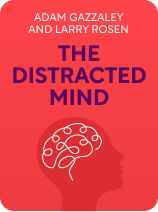

This article is an excerpt from the Shortform book guide to "The Distracted Mind" by Adam Gazzaley and Larry Rosen. Shortform has the world's best summaries and analyses of books you should be reading.
Like this article? Sign up for a free trial here.
Why are you so susceptible to interference and distractions? What are activities that help improve cognitive skills?
Technology and information overload cause interference in the brain because of cognitive control limitations. The Distracted Mind by Adam Gazzaley and Larry D. Rosen claims that this interference can be improved with certain activities that help brain function.
Keep reading to learn how to improve cognitive skills.
Improve the Brain’s Cognitive Control
Gazzaley and Rosen reason that one way to improve resistance to interference is to learn how to improve cognitive skills. Although they consider various activities to strengthen our cognitive control, we’ll focus on the four that they contend have the strongest empirical support: physical exercise, meditation, cognitive exercise, and certain video games. Of these four, they note that only physical exercise rises to the level of a prescriptive recommendation, while the other three have comparatively less empirical support.
Activity #1: Physical Exercise
To begin, Gazzaley and Rosen argue that a wide body of research clearly supports the beneficial impact of physical exercise on cognitive control. For instance, one study found that, after consistently undergoing aerobic exercise, children experienced significant boosts in cognitive control. But these results aren’t just limited to children; Gazzaley and Rosen observe that, according to multiple meta-analyses of published studies, physical exercise is predictive of increased cognitive control in adult populations as well.
(Shortform note: Some experts point out that beyond increasing cognitive control, exercise can improve your mental health in other key areas. For example, regular physical exercise has been causally linked to decreased anxiety and depression; although the details are unclear, experts hypothesize that the endorphins released by physical activity play a key role in combating both depression and anxiety.)
Activity #2: Meditation
Although exercise has the best-established benefits for cognitive control, Gazzaley and Rosen contend that consistent meditation might also be beneficial, especially for our selective attention. In support of their claim, Gazzaley and Rosen cite a seminal study that examined young adults with no previous experience meditating as they went through a five-week long meditation course. This study found that, compared to a control group, participants in the meditation course performed significantly better at tests measuring their selective attention.
(Shortform note: One particularly common form of meditation is mindfulness, which specifically targets attention skills by asking practitioners to shift their attention exclusively to the present moment. Though research into the efficacy of mindfulness is ongoing, one review of mindfulness studies noted a link between mindfulness and increased self-reported well-being.)
Activity #3: Cognitive Exercise
In addition to meditation, Gazzaley and Rosen suggest that cognitive exercise can improve our cognitive control. Cognitive exercise refers to adaptive “brain games” that become more difficult over time to match players’ skill levels. For example, in Gazzaley’s laboratory, participants took part in a game called Beepseeker—they heard three tones and had to determine whether a target tone was present among the tones, thus testing their ability to filter out extraneous information. Gazzaley and Rosen observed that, over time, older adults who participated in Beepseeker became less vulnerable to distractions in the game, demonstrating improved cognitive control.
(Shortform note: Adaptive brain games like Beepseeker work because they use a practice similar to progressive overload—a physical exercise technique that involves steadily ramping up the difficulty of workouts over time. Just as progressive overload ensures that you’re consistently challenged to yield results, so too do adaptive brain games ensure that your brain is consistently at its threshold to maximize results.)
Activity #4: Video Games
In a similar vein, Gazzaley and Rosen argue that playing certain video games can also lead to improved cognitive control. Specifically, they cite a study showing that video game players showed superior capacity for attention, both in terms of how fast they processed information and how much information they could attend to simultaneously. This finding was strongest among those who play action games because those games require juggling more tasks simultaneously than non-action games. Moreover, the authors point out that after this initial study, other studies have shown a link between playing video games and increased aspects of cognitive control, such as better working memory and goal management.
(Shortform note: In addition to improved attention, working memory, and goal management, another influential review of studies concludes that video games also noticeably improve our visuospatial cognition—that is, our ability to perceive and imagine objects’ spatial relations with one another. Moreover, because spatial cognition skills strongly predict which students will enter STEM fields, it stands to reason that improving these skills could tangibly impact students’ later career paths.)

———End of Preview———
Like what you just read? Read the rest of the world's best book summary and analysis of Adam Gazzaley and Larry Rosen's "The Distracted Mind" at Shortform.
Here's what you'll find in our full The Distracted Mind summary:
- How technology has made us more prone to distractions and interruptions
- How to modify your environment to reduce distractions and boredom
- How to minimize your susceptibility to interference and improve cognitive control






